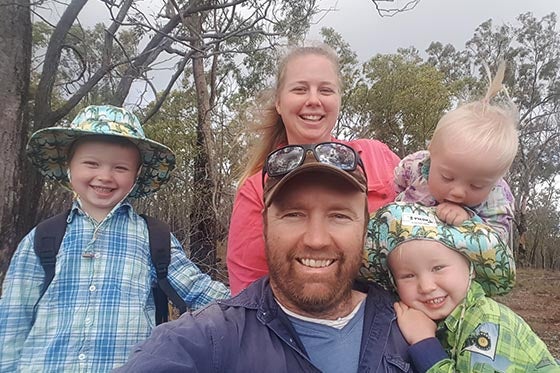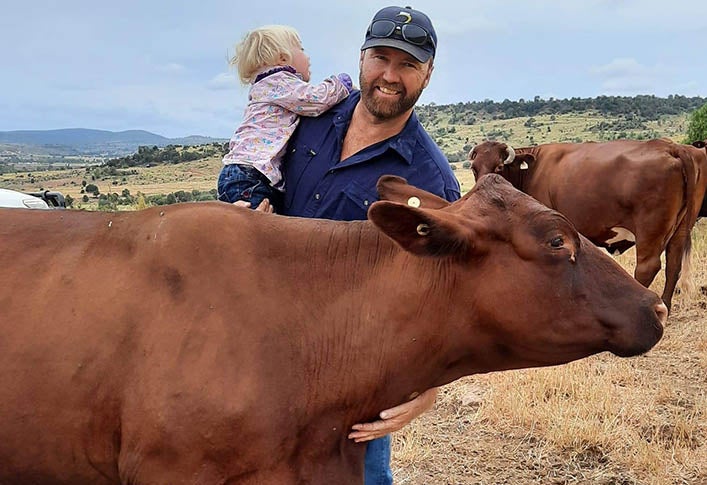Posted by on
20/04/2021
Queenslander James Henderson doesn’t define himself as a regenerative farmer, however his speedy ascent as a highly regarded leader in the field – coupled with his proven on-farm results – would certainly suggest otherwise.
The newly appointed chair of AgForce’s Young Producers Council runs a breeding and backgrounding operation on 5,400 hectares across three properties in the North Burnett and Central Queensland regions. And while beef remains at the core of the business, two carbon farming projects are providing a significant secondary income stream, and signify exciting prospects for the future.
However James admits he stumbled into the holistic grazing and carbon sequestration space almost by accident – the trauma of the millennium drought prompting his father, John, and he to explore new ways of managing their land for the harsh Australian climate.
“There were a few tipping points during the drought of 2006 you don’t ever want to re-live, it wasn’t sustainable as a business, or fair on the animals.”
Adopting a new approach, the enterprise has gradually evolved over the past decade as James sought ‘best management practice’ rather than a specific regenerative farming pathway.
James and John attended field days, talked to neighbours, signed up for innovation trials and thoroughly researched new techniques to trial on the family’s breeding property “Colodan”, Monto.
He now runs “Colodan” together with wife Kylie and their three children Douglas, Thomas and Emily, utilising multiple regenerative practices – connecting economic, ecological and social considerations in a strategic big picture view.
In recent years James has focused on avoiding broad scale tree clearing activities, while also implementing practices to repopulate and regenerate forest areas – leading to their enterprising on-farm carbon farming projects.
Through implementing practices that are known to improve the rate at which carbon dioxide is removed from the atmosphere and converted to plant material and soil organic matter, the family has earnt Australian Carbon Credit Units (ACCUs) which can be sold to provide supplemental income on “Colodan”.
And he believes there’s huge potential for farmers to tap into this growth industry.
“I certainly see a lot more opportunity in this field, with plenty more carbon markets on the horizon – they’re saying it will be a one trillion dollar industry, with global corporates already investing huge sums in carbon, and Australian farmers are in a perfect position to provide this carbon and other ecosystem services.”
“By recognising trees as an asset rather than a liability, producers can establish carbon forestry enterprises using the same land as existing cattle enterprise,” he said.
James started selling some of his credits in 2018 to a private buyer, much to the intrigue of the broader agricultural community.
“The question I get asked all the time, is “how much did you make?”, James laughed. “Let’s just say if done correctly your gross margin per hectare can equal that of the beef operation.”
The resulting dynamic tree-grass balance has also achieved its desired outcome, enabling “Colodan” to become more resilient to major climate events such as drought and extreme rainfall events.
The family’s beef operation is also more robust as a result, with cattle healthier, and happier.
“Thanks to our new grazing methods, we’ve been able to consistently achieve significantly higher revenue than in the past, indicative of the higher price we’re receiving for our stock due to improved cattle condition scores – even despite fluctuations in cattle prices and poor seasons.”
Data analysis is an important management tool used across the properties, and James confirmed that these results had all been independently verified.
The combination of regenerative practices has also decreased the property’s reliance on fertilisers, herbicides, and pesticides, which has subsequently reduced fertilizer expenses, and increased growth of native vegetation.
“It’s rewarding to know that you’re making progress, and to actually see it in your financials really rationalises everything that we do.”
A client of Rockhampton branch manager, Michael Fletcher, James said the pair enjoyed a great working relationship.
“We came across with Rabobank when we couldn’t get our carbon credit enterprise across the line with another bank, they couldn’t get their head around the fact that we would essentially be doubling production,” James said. “Rabobank however has been extremely encouraging, and I have a genuine ‘old-school’ relationship with Michael, I can pick up the phone and ring him about anything.”

James, a fourth generation farmer, has become one of the faces of the industry, even if ‘by default’.
“In regards to selling carbon credits, the accreditation process was rigorous, underpinning the stringent ACCUs standards, and I think many farmers appreciate the opportunity to talk to a fellow producer who has been through the process, and now profiting from it.”
“When I started looking into different management techniques, Dr Greg Leach of AgForce was the only person who could give me practical guidance and advice, and it was through him that I found myself joining the AgForce policy committees.”
And James is now paying it forward as a highly anticipated guest speaker at field days, generously sharing his experience with fellow producers on the ground.
Recently he signed on to the Young Producers Council – a group of 18 to 40-year-olds established to drive change amongst next generation farmers.
At the ripe old age of 38, James laughs he thought he could ‘sit in the background for a couple of years’ – however the reality was quite to the contrary, with the quiet achiever promptly promoted to Chair early in 2021.
And it seems there’s not much chance of James Henderson ever sitting in the background again.
As one of Queensland’s most successful land managers with the keys to carbon markets and the myriad potential they represent, our environment, community – and fellow farmers – have James to thank for helping lead the way across this space.
